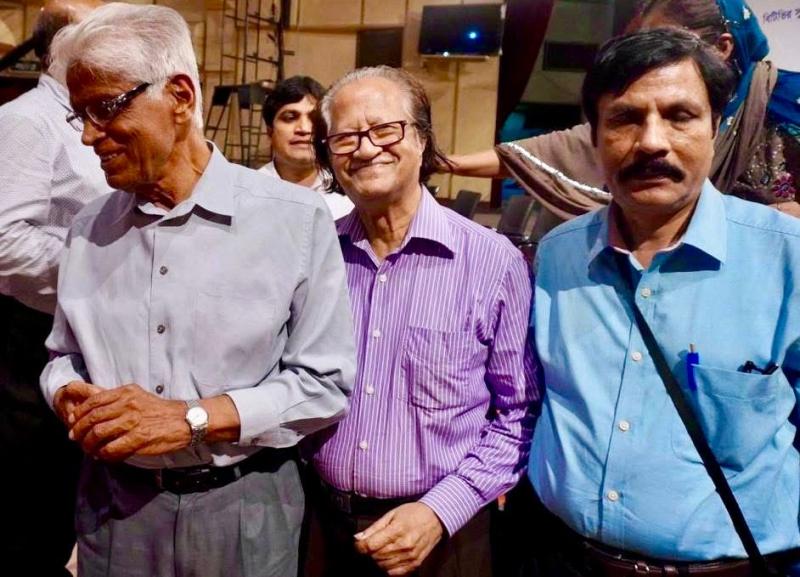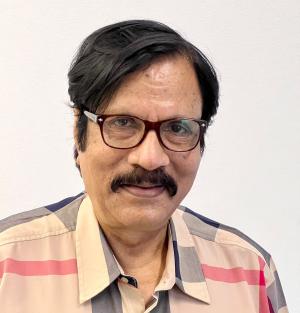On the 91st birth anniversary of the revered Mustafa Monwar, I share my reminiscences.
From the Language Movement of 1952, to the vibrant journey of television in Dhaka in 1964, to the Liberation War of 1971, and through the glorious chapters of art and culture in Bangladesh — in all of these, Mustafa Monwar played an extraordinary role. He is one of our dearest artists, who has always held both our independence and our artistic heritage close to his heart.
I came to know him during my university life. At that time, Bangladesh Television (BTV) seemed to me like a dream factory, where creative people like Mustafa Monwar worked. I never thought that one day, I too would become a craftsman in that same dream factory.
From 1970 to 1976 I studied at the University of Dhaka, and from 1976 to 1979 at the National School of Drama, New Delhi. As a student, I was somewhat indifferent to career prospects. While my friends were preparing for the civil service, I left the country to study theatre. When I returned, I was unsure what to do. One day I went to visit Mustafa Monwar at his Central Road residence. At that time, he was serving as the Executive Director of the Bangladesh Performing Arts Academy. At his encouragement, I, along with Jamil Ahmed (later founder professor of the Theatre Department at the University of Dhaka), joined the academy as drama instructors in September 1979.
On November 7, 1975, during the Soldiers’ Revolt (Sipahi Bidroho), four BTV officials were killed. On the assassins’ list were also the then Director General of BTV, Jamil Chowdhury, and General Manager Mustafa Monwar. But having received prior warning, they did not go to the BTV headquarters that day. After staying in safe hiding for some time, they eventually returned to work at the request of President Ziaur Rahman. However, neither of them agreed to go back to BTV. President Zia, who valued talented individuals, sought them out. Through Jamil Chowdhury, he founded the National Broadcasting Academy (later the National Institute of Mass Communication), and through Mustafa Monwar, the Bangladesh Performing Arts Academy was established. This academy later merged with the Bangladesh Shilpakala Academy, where Monwar also served as Director General.
Many still remember the immensely popular BTV program Notun Kuri. Initiated under the patronage of President Ziaur Rahman, the main concept behind this series came from Mustafa Monwar, even though he was no longer working at BTV. Zia had many plans for BTV, and under his tenure, a group of us young producers joined BTV in 1980. It was also during his time that the State Television Awards, the Ekushey Padak, and the Independence Award were introduced—though the Television Awards were later discontinued during Ershad’s rule.
Even while away from BTV, Mustafa Monwar produced Raktakarabi (Red Oleanders) by Rabindranath Tagore with state sponsorship. Although production began in 1977, it was completed at the end of 1979. Since I was involved with the Performing Arts Academy at that time, I had the opportunity to observe the editing process closely. When Raktakarabi was first broadcast in January 1980, it created a tremendous stir in the theatre and television world of both Bangladesh and West Bengal. I myself wrote an article about it that was published in the weekly Robbar.
The legendary theatre personality Shambhu Mitra and world-renowned filmmaker Satyajit Ray remarked that they had never imagined such a large-scale drama could be so brilliantly produced for television. For this reason, I feel more comfortable calling Raktakarabi not just a television play, but a complete theatre production made for the medium of television.
The grandeur of its sets, three-dimensional lighting, costumes, and makeup — everything was infused with theatrical richness. Performers such as Dilshad Khanam, Golam Mostafa, Hasan Imam, Afzal Hossain, and Sayedul Anam Tutul gave their utmost. Mustafa Monwar was a magician of art — he knew how to bring out the very best from his actors.
He was also well-known in Kolkata. Initially a science student at Scottish Church College, he later enrolled at the Government College of Art. In 1959, he graduated in Fine Arts, standing first class first, which drew widespread attention. Returning home, he began teaching at Dhaka Art College. In 1964, when television was launched in Dhaka, he started working as a producer and helped establish television as a creative medium in Bangladesh.
Mustafa Monwar popularized puppet theatre in our country. From making the puppets to writing scripts, selecting artists, applying music, and directing performances — he did it all himself. During the Liberation War of 1971, cultural activists played a crucial role in inspiring war-ravaged people with hope and courage. Mustafa Monwar went to refugee camps in India, where he staged puppet shows. Through simple language, he conveyed the purpose of the Liberation War, the necessity of independence, and the brutality of the Pakistani army. With puppet characters, both children and ordinary people could easily grasp the meaning of the war. These shows gave strength to the families of freedom fighters and replaced despair and fear among refugees with hope and determination. Monwar believed that puppet theatre was not merely entertainment, but also a language of mass movement. His effort remains a unique example of cultural resistance during the war.
In 1989, during the Silver Jubilee of BTV, Mustafa Monwar briefly returned as Deputy Director General. He designed the entire 25th anniversary celebration, which included participants from Pakistan, India, and Britain. I recall that Zaman Ali Khan, Director General of Pakistan Television, also came. Though Bengali by birth, he had stayed in Pakistan after 1971. His wife, Azmeri Jaman Reshma, was a popular Bangladeshi actress who had moved from Pakistan to Bangladesh and never returned.
In 2014, during BTV’s Golden Jubilee, Mustafa Monwar and Jamil Chowdhury served as chief patrons. For the first time since 1975, Jamil Chowdhury returned to the BTV headquarters in Rampura, setting aside decades of estrangement. The 50th anniversary celebration saw a large gathering of people from home and abroad. Among them was Mordi Cohen, the first announcer of BTV, who came from Kolkata. His handsome appearance and personality added a distinct aura to the event. Sadly, shortly after returning to Kolkata, he passed away in 2015.
Today, the two legendary founders of television in Bangladesh, Jamil Chowdhury and Mustafa Monwar, are still among us. Jamil Chowdhury, at 92, lives in a modern old-age home in Toronto, while Mustafa Monwar resides in his home in Dhaka.


 Kha Ma Harun
Kha Ma Harun